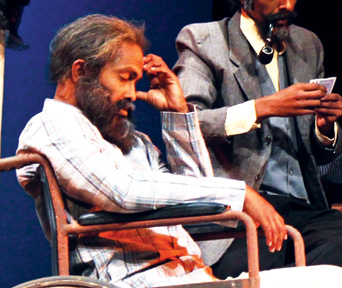The role of the writer in The Seagull
by Dilshan Boange
Recently I had the opportunity of watching a production of the
Russian master playwright Anton Chekov’s The Seagull as a Sinhala
translation by the title Muhudu Lihiniya directed by Sampath Perera. The
play went on the boards at the Tower Hall on December 17, 2014. It was
performed by a cast of young amateur actors who displayed a remarkable
level of talent and show great promise as thespians.
It came to my knowledge subsequently that the play The Seagull is
amongst the prescribed primary texts in the present English Literature
syllabus for the GCE Advanced Level examination. Upon coming to know of
this I felt that I could provide a commentary on a particular theme that
I hope will be of some value to readers who take an interest in the play
of Chekov, especially perhaps in this case students and young teachers
of English literature who engage with the text of The Seagull.
 The theme I would like to discuss as a critical commentary is that of
the aspect of writers and how the role of the writer has been portrayed
in The Seagull. The theme I would like to discuss as a critical commentary is that of
the aspect of writers and how the role of the writer has been portrayed
in The Seagull.
However, I must admit that I do not claim that what I offer in this
article is an exhaustive analysis of that theme. My intention is to
provide hopefully some useful key points to understand the significance
of the theme via certain characters.
Theme
The characters who are connected to the theme of writers and their
role in the story are – Kostia Treplev, Piotr Sorin and Boris Trigorin.
They represent three very different layers to the theme. Firstly, there
is Sorin who is aged and kind to his nephew whose artistic ambitions he
applauds.
Sorin is a symbol of the ageing and vanishing class of educated
provincial landowners in tsarist Russia as it drew closer to what became
the overturning of the system through the Soviet revolution.
Sorin says very openly that he too dreamt to be a writer but could
never achieve it. He therefore represents a generation and segment of
tsarist Russian society that couldn’t make their aspirations come true
optimally as they envisioned in their youth.
But one of the questions that may be asked about the character of
Sorin is whether he had any specific reason to want to become a writer?
What was the goal he hoped to achieve? The answer may be hinted at
through what he says to his nephew in the opening scene. When Kostia
says to his uncle about his mother’s lover –the writer Trigorin, that he
is a writer who is not in the league of the great Russian writers such
as Pushkin or Turgenev but nevertheless read and appreciated, Sorin says
that being even a small time writer is something of a glory or
accomplishment that wins the respect of people. Perhaps the reason Sorin
never managed to become a writer was that he didn’t have sufficient
specific objectives to achieve through writing alone.
Adornment
We must keep in mind that he is a former civil servant who had a long
and illustrious career. Therefore, perhaps becoming a writer would have
meant as most to him as an added credential to his name. An adornment to
his name that would make him part of society’s cultural elite. Those
could have been Sorin’s reasons to dream of becoming a writer.
Boris Trigorin is a character who presents a notable amount of
duplicity through his role in the story. He is opportunistic and
exploitative.
He uses his status as a writer to further his social goals and
ambitions. The way he charms and uses Irina Arkadina and Nina Zarechnaya
is evidence of his insincere ways.
And through gauging naive young Nina he draws material for future
works. It is in a way an admission of his limits of what he knows about
people and their world of emotions.
However, he constructs beautiful imagery through words which beguile
women such as Irina and Nina.
|

Scenes from the play |
To Trigorin, being a writer is his means of survival; which is both
financial and social survival. Therefore, one may ask how much of his
own personal life experiences actually form the basis of his work? In
contrast to the approach to writing and the purpose of being a writer
which is shown by Trigorin’s character, Kosita who becomes a writer to
the end of the play shows a stark difference.
Tormented
Kostia is a bitterly anguished young man who is tormented by many
things as being neglected by his mother, not being appreciated as an
artist, feeling underrated in his talents and being financially not
stable.
When we see towards the end of the play that Kostia has become a
writer there is in him a very staid and serious nature in his demeanour
and he is very purpose driven in his writing.
He immerses himself in his writing in a way that shows a commitment
to being a writer that surpasses what Trigorin presents through his
character as a writer.
And one of the key elements that give us insight as an to what has
made Kostia a committed writer, develops when Nina comes back towards
the end of the play and Kostia reveals to her that her desertion of him
left him utterly lonesome and anguished and that it was through his
writing that he hoped to lessen his pain of losing her love.
In effect it was his bitter life experiences of his love for Nina and
losing it that gave him his spirit as a writer. Kostia’s anguish and
suffering, his longing for Nina is what becomes his inspiration or the
fount of his work as a writer.
In this respect one can suggest that Kostia’s expressions are
outpourings from his heart and his actual feelings while Trigorin
constructs his writings from what he gathers from various sources and
pieces together captivating wordings. Chekhov perhaps wanted to build in
his play a premise by which the role and purpose of the writer as an
artistic figure in the eyes of society could be viewed through drama.
And the three male figures –Sorin, Trigorin and Kostia represent this
theme within the story and offer an interesting aspect in the play to
investigate the role and image of the writer in Russian society as seen
by Anton Chekhov. |

